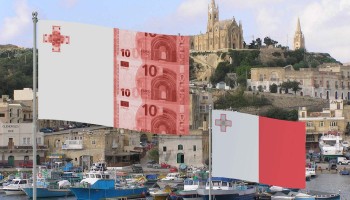“I have no doubt that this is an absolutely corrupt scheme in which members of government, real estate agents, lawyers, and others are involved,” says European Parliamentarian Ana Gomes.
She’s in the café of the Hotel Baia on the seaside near Lisbon. And she’s talking about her country’s Golden Visa scheme, which allows wealthy foreigners to live and work in Portugal — with free access to the European Union’s Schengen Area — in exchange for a hefty investment in real estate, an investment fund, or job-creating enterprises.
It sounds good to many, but not to Gomes. “From the beginning in 2012, when it was created here in Portugal, I found it totally immoral and it seemed to me a mechanism to facilitate corruption,” she says.
The hotel is in the Lisbon suburb of Cascais, once a medieval walled city and now one of Portugal’s better-known tourist towns. It features a number of beautiful buildings that are starting to attract more and more foreign investment. The Old Town is home to the medieval Fortress of Our Lady of Light, the whitewashed Church of Our Lady of the Assumption, and the Citadel Palace, a former royal retreat.
Some real estate advertisements cite the country’s Golden Visa program directly. “Thanks to the so-called Golden Visa, this is the right time to invest in Portugal,” reads one of them.
Among those taking advantage are world-renowned celebrities like Madonna who is hunting for properties in the capital. Until it was recently overtaken by Spain, Portugal attracted more investment through its Golden Visa program than any other European country.
Short Stays in Portugal Promise EU Access
The Golden Visa program was launched on Oct. 8, 2012. By the end of January 2018, the country had issued 5,717 residence permits in exchange for investment and another 9,559 for family reunification.
The country makes the process easy. In exchange for an investment of at least €350,000 in a place targeted for development — the amount is higher if you want to invest in more upscale areas — it allows people to live and work in Portugal, and eventually apply for permanent residence, as long as they stay in the country for just a week in the first year and two weeks in subsequent years. The first visa lasts for one year; it can then be renewed at two-year intervals.
So far, the program has raised about €3.5 billion, although there are signs that interest is waning. As of January 2018, investments were down about 30 percent from the same period in 2017.
Gomes concedes the program has brought in much-needed revenue, but argues that this doesn’t justify the damage it could do to Portugal. “If everything is going to be justified by the economic benefit, then let’s all go into the drug business,” she says.
Since the program started, she has worried that it would be used for money laundering and tax evasion. “Many of these individuals are obviously PEPs [Politically Exposed Persons, the financial industry’s term for government officials at high risk for bribery],” she says. “I talked to the Financial Research Unit [of the Judicial Police] and the due diligence investigations that are made are minimal.”
She says officials do investigate applicants’ banking histories and money transfers, but thinks more needs to be done. “I don't think the controls are systematic or reinforced when it comes to PEPs, and they are only [put in place] when there is some kind of doubt, for some reason, about their financial transactions. I know that some of the transactions are probably made in cash.”
Chinese Gold
Some Chinese citizens may have broken the law right out of the gate.
How? It is illegal in China for a person to transfer more than $50,000 out of the country in a single year. But almost two-thirds of Portuguese Golden Visas — 64 percent, or 3,645 of the 5,717 issued through January 2018 — have been given to Chinese citizens. Since 2012, the investment in Golden Visas coming from China has surpassed €2 billion.
While most of the new Chinese residents are law-abiding in Portugal, three were among the 21 principal suspects in Operation Labyrinth.
The investigation, which took place in November 2014, netted several Portuguese officials who are accused of taking bribes in exchange for granting Golden Visas to non-EU citizens. The detainees are suspected of corruption, money-laundering, influence-peddling, and embezzlement.
One of the accused is Miguel Macedo, who resigned from his position as Minister of Internal Affairs after the initial raid. Macedo now faces charges of influence peddling for conducting lucrative real estate deals with Chinese entrepreneurs who were seeking to obtain Portuguese visas.
Just three months before the Operation Labyrinth raid, the parliamentarian Gomes had written to Dr. Carlos da Silva Costa, the Governor of the Bank of Portugal, warning him that the Golden Visa scheme could be “abused by individuals and criminal organizations with great economic power” and that it could give rise to “money laundering, using the Portuguese financial system, under the pretext of investing in the country.”
‘A Crime Import Scheme for the Schengen Area”
Gomes is still taking authorities to task.
Last May, she wrote to Vera Jourova, the European Commissioner for Justice, Consumers and Gender Equality, citing the conclusions of a report about the program from the Portuguese General Inspectorate for Home Affairs.
As reflected in her letter, the report reveals a long list of irregularities. Gomes says she has written many such letters over the years. But this time, she got an answer beyond the acknowledgment of receipt and a generic “we can’t do much” response.
Jourová wrote back to Gomes that the European Commission will take her warnings into consideration and include her observations in the upcoming European Commission report on European countries’ Golden Visa programs. Gomes says the report is to be issued at the end of this year.
“For the first time this year, I had a positive reaction,” Gomes says. But her fight goes on. She’s still trying to obtain a list of all Golden Visa recipients in Portugal, which the government is refusing to make public.
“It is a corrupt scheme to support the corrupt,” Gomes says. “This is the only explanation for not giving me the list, including family members. I would not be surprised if in some cases they are real criminals.” She says it might as well be “a crime import scheme for the Schengen area.”
The Place Everyone Wants to Buy
Ninety percent of the money raised by Portugal’s Golden Visa program comes from real estate investment. A recent scandal involving one of Portugal’s most iconic modern buildings shows why this could be problematic.
The Estoril Sol Residence, a 15-story cubic construction (nicknamed the “Tertis”) with extraordinary seafront views, is not far from the Hotel Baia. An investigation into the 2011 purchase of a €3.8 million flat in the building shows how expensive real estate deals can work.
Manuel Vicente, the former vice president of Angola, a former Portuguese colony, is now being accused of bribing prosecutor Orlando Figueira in 2013 to drop a probe into possible money-laundering involving that apartment’s purchase.
According to the 2017 US State Department’s International Narcotics Control Strategy Report, which deals with money laundering and financial crimes, “suspect funds from Angola are used to purchase Portuguese businesses and real estate” and notes allegations that “Portugal serves as a hub for laundering illicit funds for Angola’s ruling class.”
Vicente recently sent a letter to the prosecutor asking the trial to be held in Angola, instead of Portugal. The country has denounced Portugal’s previous attempts to investigate Vicente as “neo-colonialism.”
Real Estate as a Laundromat
Susana Coroado, vice chairman of Transparency International in Portugal, told OCCRP via email that “money laundering specialists have known for ages that luxury real estate is one of the best investments for criminals because they can launder a great amount of money in just one transaction and ... easily resell the property and get their money back.”
Citing her organization’s evaluation of Portugal’s anti-money-laundering mechanisms, Corodao said that that “prevention fails at many levels, particularly in real estate.”
“Money laundering through real estate is not a new phenomenon, but the Golden Visa program facilitates it exponentially,” Coroado writes. The program, she explains, enables criminals to “place their dirty money in a safe haven … [and] demands very little from applicants.”
Coroado says a range of business people benefit from Portugal’s Golden Visa program, including real estate agents and lawyers who don’t “properly identify their clients and the source of their funds. Pressure to conduct business makes them overlook their anti-money laundering obligations.”
Meanwhile, she says, government agencies that are supposed to regulate the construction and real estate sector don’t have enough money to do the work properly. “All involved believe they have limited responsibility and push reporting obligations to other entities.”
As it did in Angola, Portugal’s Golden Visa program can have international implications. Coroado notes that infamous corruption cases in Brazil, like Odebrecht and Lava Jato, are being linked to applicants in Portugal.
Coroado believes some progress has been made, specifically a report by the Financial Action Task Force on Money Laundering, an intergovernmental organization that develops policies to combat money laundering and terrorism financing.
“In late 2017, the FAFT-GAFI published its own evaluation and, despite using softer language, shared our conclusions,” she said, noting it indicates “international cooperation is improving. The report is a good sign for our work, because it reaffirms what we have been saying.”
This story was produced as part of the Global Anti-Corruption Consortium, a partnership between OCCRP and Transparency International.








